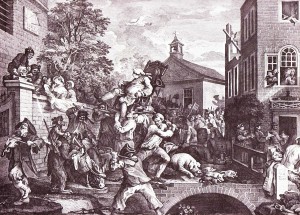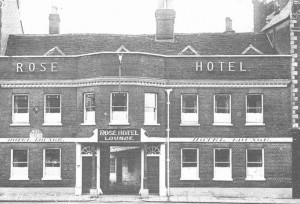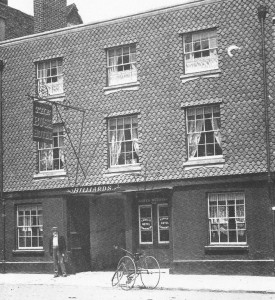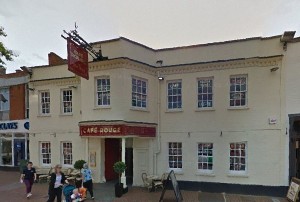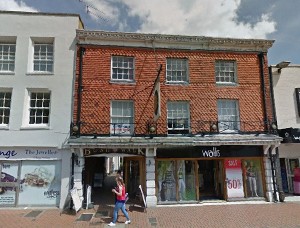This article originally published in 1st May Wokingham Paper 2015. In this week’s edition of ‘Wokingham Remembers’ we turn our attention to Wokingham’s contribution to the national General Election of 1857. Our story is about two political parties vying for the votes of the local electorate; the Tories (Conservatives) with their ‘office’ at the Rose Inn and the Whigs (Liberals) embedded in the Bush Inn, situated opposite in Market Square. Mike Churcher explains:
Acts of electoral bribery had been legislated against by 1857, but the supply of such ‘treats’ as free beer were still to be outlawed. As there was no secret ballot at this time, the political parties used every means they could to influence which way the electorate would vote. This is a time when elections all over the country were lively, bawdy and even dangerous. Wokingham’s election of 1857 followed that same blue print.
In the following passage, Arthur Heelas, (a local historian writing in the 1930’s) tells of a conversation he had with William Breach, a local resident, who shared his reminiscences of Wokingham’s part in the 1857 General Election.
‘Mr Breach had a vivid recollection of the election held shortly after the Crimean War (1856).
In front of the old coaching inn “The King’s Arms” was a raised platform on which a band was playing lively airs, to stir up the enthusiasm of the crowd; a proceeding that was hardly necessary as great difficulty was experienced at these elections in controlling the excited mobs, especially as each side supplied a lavish quantity of strong beer to its supporters.
The Rose Inn was the headquarters of the Tories, while the adherents of the Whig Party made The Bush Inn their political centre. Each inn was zealously and strongly guarded by its partisans against any sudden raids from their rivals.
In order to strengthen the fighting elements of a party, hefty men from the neighbouring towns and villages were recruited and brought into the town; at this particular election some of the roughest characters from Reading were engaged, among them were several notorious sporting sweeps who were considered rare fighters. These men were smuggled into The Rose by the back entrance and held in reserve until all the arrangements for a great sortie were completed. When all was ready the large gates of the archway were opened and out rushed the hirelings and local firebrands, fully armed with staves and cudgels, making for the rival crowd outside The Bush Inn.
Within a few minutes a big fight was raging, men were knocked over like nine-pins and victory was temporarily claimed by the ruffians; but suddenly one of the best known local characters, Harry Horne, appeared on the scene. Horne was a great powerful fellow and a born fighter, he soon managed to capture a stout staff and then he set about the hirelings. It was deemed a wonderful bit of cudgel work as Horne ably defended himself against their blows and dealt with them unmercifully. At the end of the fray the pavement and road were strewn with the victims and covered with blood, in fact it had the appearance of a miniature battle field.
Now the fortunes of war were reversed, attention was directed by the Whig victors toward the Tory Rose. With a great cry and a rush the old inn was attacked. All the windows were completely destroyed as well as everything within reach of the mob and those within pelted with all kinds of missiles thus forcing their retreat from the front rooms of the house. Meanwhile great efforts were made to destroy the large gates to effect an entrance into The Rose, but fortunately the defenders within managed to prevent this and were thus able to save the old inn from being ransacked. Mr Breach, had very strong recollections of the part he played himself and although just nine years old managed to do his bit and get a good blow in without ill results to himself.’
Although the Whigs were the better fighters, the winner of the election was the Conservative, Robert Palmer, who you might remember from last week’s article on the Wokingham Fire Brigade. Palmer created a force of Special Constables which ensured a strong response to the acts of arson which were becoming a habit around the locality. Similarly, it seems election time shows just how feral and lawless Wokingham could be, with two sets of fighting tribes; the Whigs in one corner and the Tories in the other.
These brutal occasions were a national habit and the result of a corrupt electoral system with votes taken in open view and not by the secret ballot we have today. Open ballot meant everyone could see which way individual votes were cast and had repercussions after Election Day, often leading to job dismissal, loss of home or even a beating.
The Wokingham experience and electoral legislation of the time.
Particularly interesting in the Arthur Heelas story, are the dates and the electoral legislation of the mid to late 19th century. The election of 1857 took place after the Corrupt Practices Act of 1854 which sought to prevent the buying of votes. Therefore providing free beer (as Mr Heelas stated) may not have been a straight bribe, but because of the open ballot system, was still a useful tool to win votes. It would have taken a brave man to drink free beer and vote for the opposition in full view of the mob! Following the1872 ‘Ballot Act’ (which introduced secret ballots) and the 1883 ‘Corrupt and Illegal Practices Act’ (which limited candidate expenditure), treats such as free beer finally began to fade from election day.
Did these Acts of Parliament eradicate the scenes of violence from Wokingham’s later elections?
No. Violence was still a part of the election atmosphere well into the 1880’s as Mr Heelas describes in one of his own election experiences:
‘The writer has also had some rough experiences in defending the Rose Inn, some years later during elections. “On one occasion a sortie was made to enable a sporting “young blood” (who had earlier in the day flicked his whip whilst driving and upset the crowd) to return to his house. With the twenty or thirty men surrounding him, the sortie fought its way through the hostile crowd where blows were freely exchanged and several persons knocked down. The crowd at the time was burning the election boards and notices in the street. Great difficulty was experienced in shutting the gates to the Rose during the struggle as a determined attempt was made to capture the place. However, no serious damage occurred as a force of police arrived and soon restored law and order’.
Arthur Heelas was not born until 1869 and therefore, none of the electoral legislation quelled the violent episodes he experienced as a young adult. If Wokingham’s elections were indeed still violent affairs as Mr Heelas suggests, then something other than an election was driving the fighting.
For all the effort, was the legislation popular?
Unsurprisingly the legislation was not popular amongst the drinking classes; elections were a time when the drudgery of everyday life was interrupted by a day of partying and free drinking. The legislation, whilst clearing away some of the elements of the corrupt practices within the electoral system, did nothing to quell Wokingham’s attraction to violence. In future editions of this Wokingham Remembers page, we will examine further irksome customs which threaded their way through Wokingham’s bygone communities.

